|
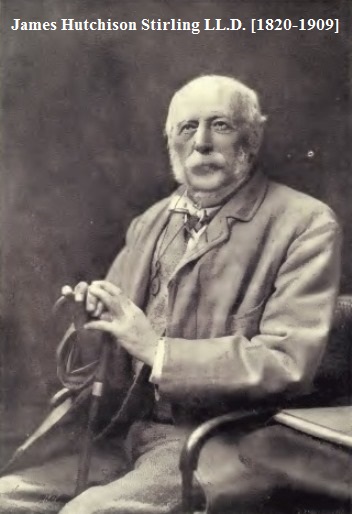
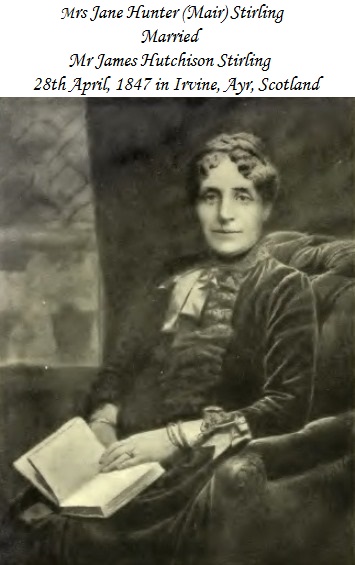
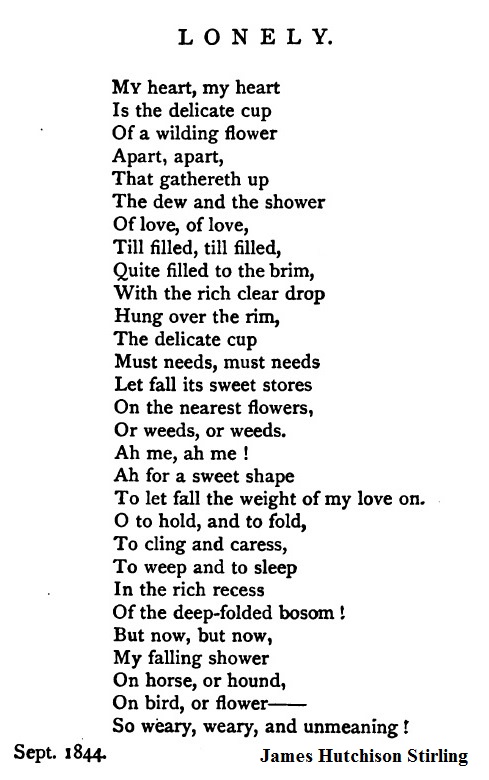
James
Hutchison Stirling was born on 22 June 1820, the fifth
son of William Stirling, craftsman, of Glasgow. He first
matriculated at the University of Glasgow in 1833 at the
age of 13, and followed a full Arts curriculum (1833
Latin, 1834 Greek, 1835 Greek, 1836 Logic, 1837 Ethics)
before continuing on to medical studies under Harry
Rainy (1792-1874), who became a professor of Medical
Jurisprudence in the Faculty of Medicine in 1841, and Dr
Buchanan.
Early in life he showed a leaning toward philosophical
studies, and in 1838 the professor of moral philosophy
gave him as a subject for a thesis, St Anselm's argument
in the Proslogion for the existence of God. With the
fine carelessness of youth Stirling is said to have
pronounced this argument a sophism, although in later
life he came to regard it as "the first word of modern
philosophy."' He did not obtain a degree in either Arts
or Medicine from the University of Glasgow. He became a
Licentiate of the Royal College of Surgeons of Edinburgh
in 1842 and a Fellow in 1860. In 1843 he settled in
practice at Hirwain, Glamorganshire, and later he moved
to Glyn Neath. For a while he was a surgeon to the
Hirwain and other iron and coal works in South Wales.
Upon the death of his father in 1851 Stirling retired
from practice and went abroad. He studied firstly in
Paris under Dumas, Orfilia and Milne Edwards. In 1854 he
moved to Germany, where he resumed his philosophical
research of Kant and Hegel. In 1857 he returned home and
turned to writing books on philosophy. His publications
include: The Secret of Hegel: being the Hegelian system
in origin, principle, form, and matter, 1865;
Materialism in relation to the study of medicine: an
address to medical students, 1868; Lectures on the
philosophy of law, 1873; Text-book to Kant: the critique
of pure reason : aesthetic, categories, schematism:
translation, reproduction, commentary, index, with
biographical sketch, 1881; Darwinianism: workmen and
work, 1894; and What is thought?: or, The problem of
philosophy by way of a general conclusion so far, 1900.
He was a Foreign Member of the Philosophical Society of
Berlin and delivered the first Gifford Lecture Series at
the University of Edinburgh on Philosophy and Theology
in 1888-1890. He was awarded an Honorary Doctorate of
Law from the University of Edinburgh in 1867, and one
from the University of Glasgow in 1901. James Hutchison
Stirling died at the age of 89 on the 19th March 1909.
He left an estate of c £10,000 to his four daughters,
Jessie Jane Armstrong, wife of the Rev Robert Armstrong
of Glasgow, and Amelia, Florence and Lucy, who were all
three living at the parental home in Edinburgh.
Edinburgh University still awards an annual James
Hutchison Stirling Prize to the best student studying
for the degree of MA with Honours in Philosophy who has
attended a second course in Philosophy, but who is not
yet in his or her final year.
Sources: Glasgow University Archives student records,
Medical Directory 1898, The Lancet, March 27 1909,
p.248, Calendars of Confirmation.
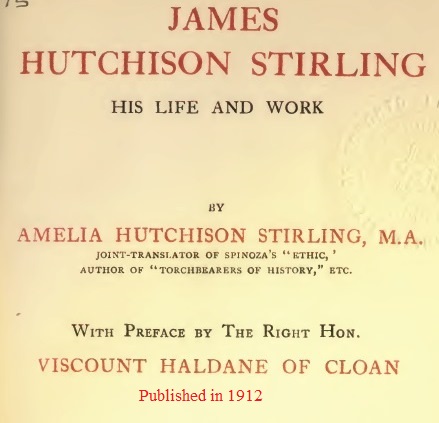
PREFACE
It is my
privilege to have been invited to write a few lines of
preface to the life of one whom I knew well and admired
greatly. James Hutchison Stirling was a man of genius,
rugged and uncontrollable, yet genius that could not be
mistaken for anything less. I knew him first when I was
a student at the University, and I saw him from time to
time until nearly the period of his death. The man is
mirrored in his books, and above all in the greatest of
his books, “The Secret of Hegel.” To come under the sway
of the “Secret” one must have oneself worked hard.
Stirling made the meaning as plain as that meaning could
be made. But to penetrate into the inmost significance
of Reality can under no circumstances be possible
without the severest effort at concentration, and this
the book demands. But when the effort has been made,
and, it may be after several struggles, success has
come, the reward follows. I doubt whether a more
remarkable piece of exposition has ever been
accomplished in our language. It is marvellous that,
working at the time he did, without the help of a single
worker in the English language who had thrown light on
what Hegel really taught, Stirling should have produced
the book he did. No one since his time has got further,
possibly no one as far. He penetrated into the inmost
essence of the Hegelian system as none but a man of
genius could have done, and his work remains unrivalled
to this day. His exposition is charged with meaning, and
its flow is that of a torrent. No wonder that he held
Carlyle in reverence. In different forms the two men
applied to different subject-matters the same gift. Both
were expositors, but expositors of a genius that made
their teaching new and original. “ Sartor Resartus ” and
“ The Secret of Hegel ” may both be fairly said to have
been epoch-making books. Carlyle wrote for the many,
Stirling for the very few, and that was the main
difference between them. The concentrated work which
each bestowed on what he produced was of the order that
is colossal.
It is only by grappling with “The Secret of Hegel ” that
one can realise the extent of its author’s power and
penetration. Through long years of study he mastered the
meaning of that most difficult and most rewarding of
modern writers on philosophy. At the end the result he
had reached was returned in a torrent; in language the
force and picturesqueness of which were only matched by
the conviction every sentence breathed forth. The book
embodies a result which is likely to be enduring. It
will hardly be superseded, for it has the quality of the
work of genius. Along the road it has travelled one
cannot get any further.
Haldane of
Cloan.
London, 3ra November 1911
Author's
Note
In one of
Stirling’s articles on Kant, to which allusion is made
in the following pages, this remark occurs: “If the key
has been found for the casket of Hegel, and its contents
described, it is quite certain that the public has never
yet seriously set itself to apply this key or examine
these contents. Something to stimulate or assist seems
still to be wanting.” In the present volume it is hoped
that at least a step has been taken towards supplying
what is wanting. It has been sought to “ stimulate ” by
laying before the public the record of a life-long
devotion to the study and development of the Hegelian
philosophy, a life-long conviction of its profound value
to humanity. It has been attempted to “ assist ” by
showing that, though it is only the earnest student of
philosophy who can ever hope to penetrate to the centre
of the Hegelian system, Hegel has yet something to offer
to every thoughtful reader. Throughout the later portion
of the present book—especially in Chapter VIII., and in
those chapters which deal with Stirling’s various
works—attempts have been made to indicate, in terms
intelligible to a technically uninitiated reader,
Stirling’s general philosophical position, and the
nature of the service which he and thinkers such as he
have rendered to mankind.
It is impossible to let these pages go to press without
tendering thanks to those who, in various ways, have
helped in the task of preparing them— to Mr Alexander
Carlyle and Mr Walter Copeland Jerrold for kind
permission to make use of valuable letters from Thomas
Carlyle and Douglas Jerrold respectively; to Mr W.
Hale-White, Mr Holcomb Ingleby, the Rev. John Snaith,
Emeritus Professor Campbell Fraser, and the family of
the late Professor S. S. Laurie, for kindly lending
important letters written by the subject of this memoir,
and to Mr Murdoch for the excellent photograph of the
philosophers study, from which one of the illustrations
has been taken. Lastly, special thanks are due to Lord
Haldane, who, in the midst of the innumerable public
claims upon him, has shown that his interest in the
higher philosophy is as deep as ever by writing the
appreciative and vivid estimate of Stirling which forms
the Preface to the present book.
A. H. S.
Edinburgh, November 1911.
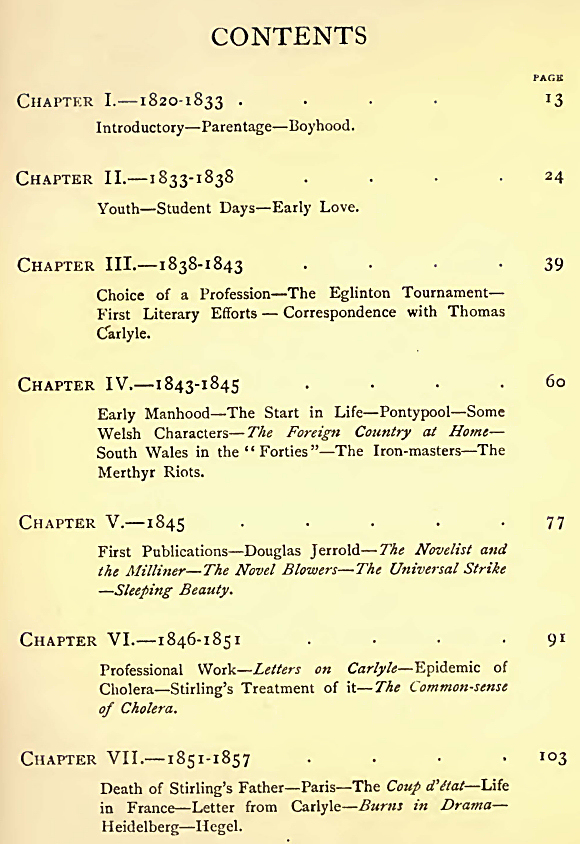
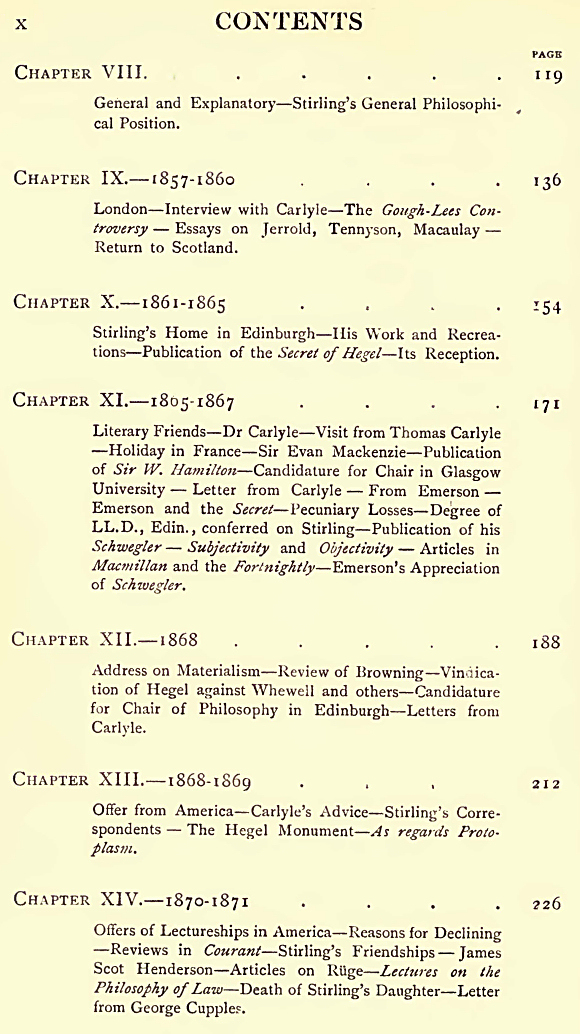
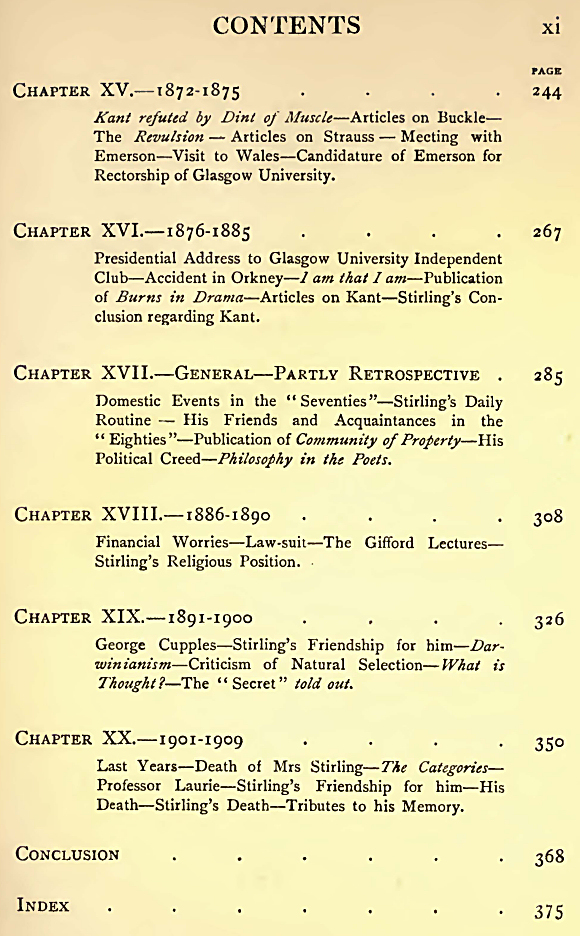
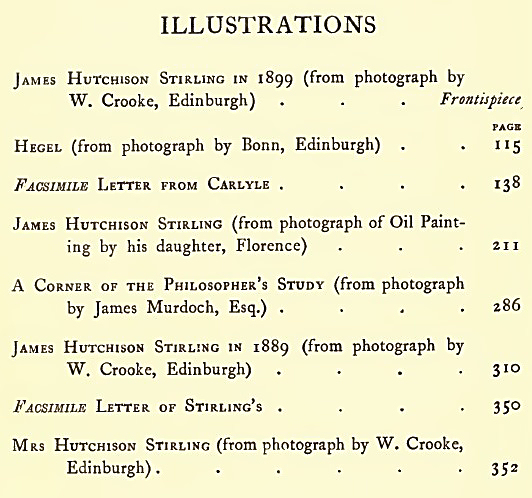
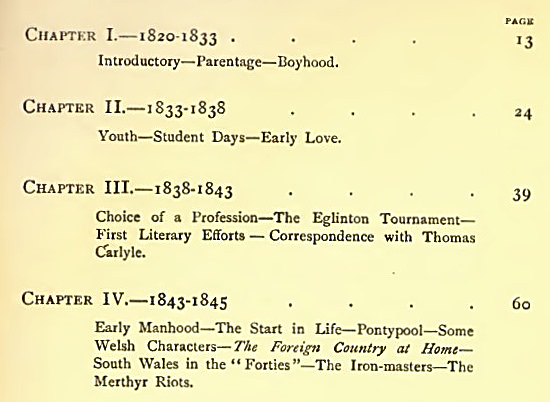
Section 1
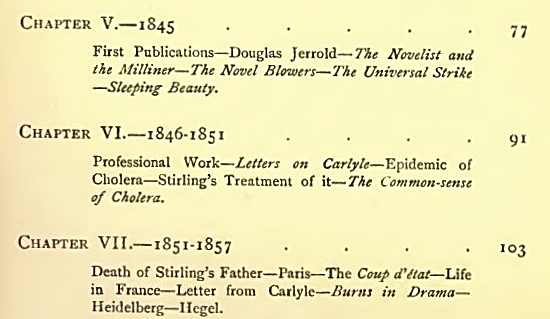
Section 2
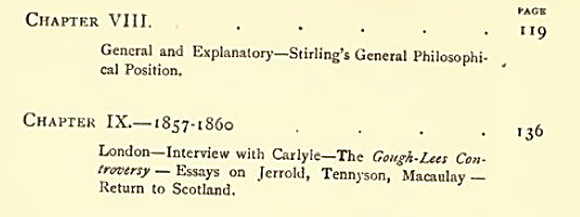
Section 3
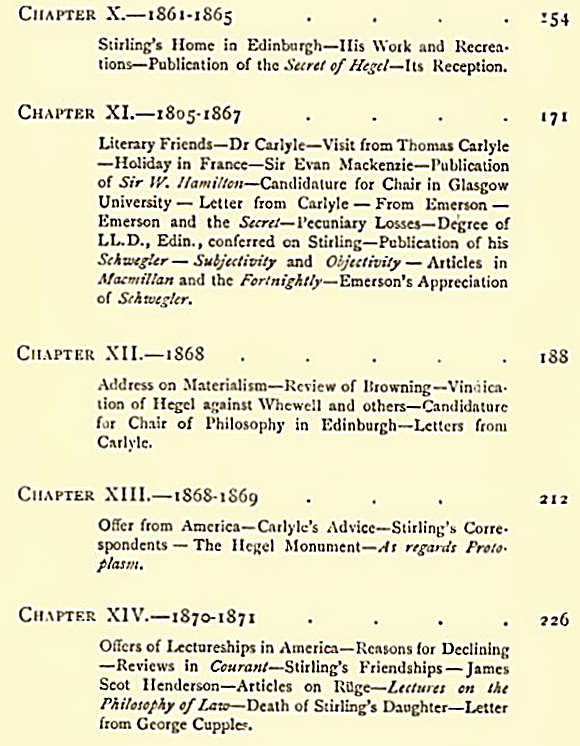
Section 4
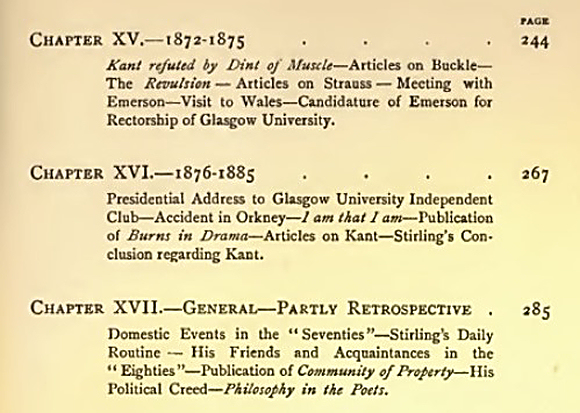
Section 5

Final Section
Philosophy and Theology
His 20 lecture series
The
Secret of Hegel
Being the Hegelian System in Origin, Principle Form and
Matter
The
Categories
|

